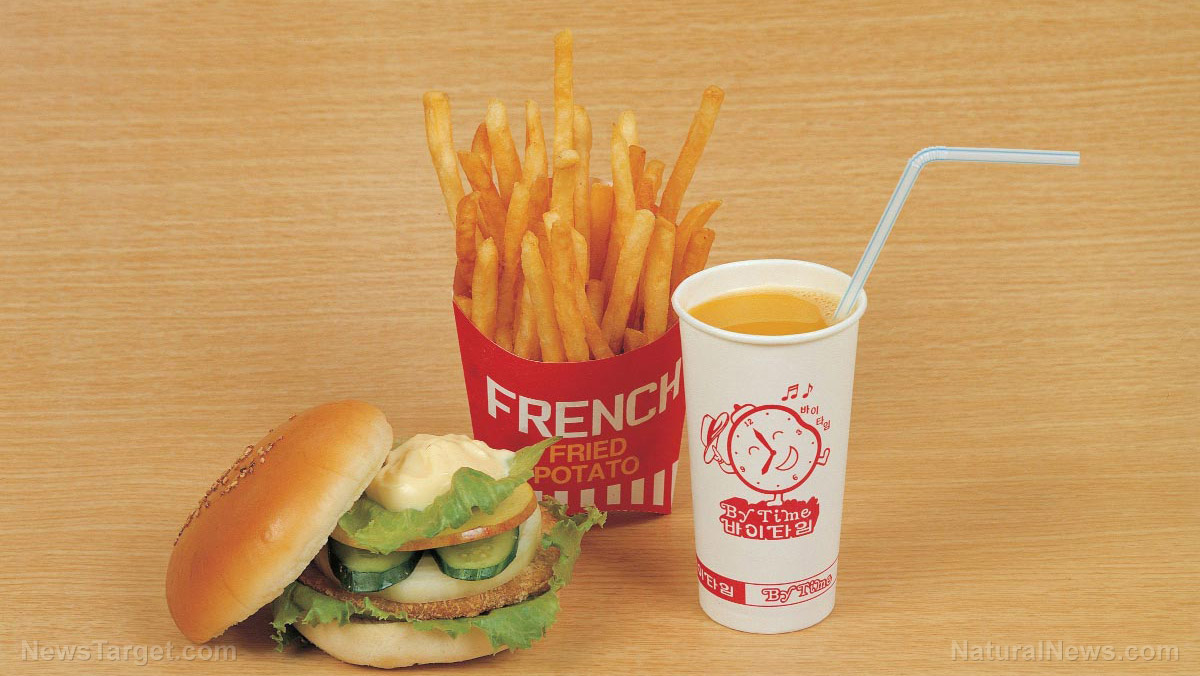 Parler
Parler Gab
Gab
- A study tracking 500,000 participants linked high UPF consumption to increased mortality risk. Reducing intake could reverse a "convenience tax" harming longevity and environmental health.
- UPFs (e.g., microwave meals, sugary snacks) lower diet quality, raise BMI and trigger inflammation. Younger generations now consume UPFs at higher rates than older ones did midlife.
- UPFs damage gut bacteria essential for serotonin production, leading to higher anxiety and depression rates. These foods hijack the brain’s reward system, creating long-term dependency.
- Industrialization and post-WWII efficiency prioritized convenience over health. Today, 60% of environmental degradation stems from UPF production, packaging and consumption.
- Subsidizing fresh food, workplace meal reforms and kitchen education can help. Breaking UPF dependency requires societal shifts — not just individual willpower — to protect health and the planet.
The metabolic cost of convenience
The study, which paired the NOVA food classification system with the Healthy Eating Index-2015, broke new ground by analyzing both the volume and ingredients of ultra-processed foods (UPFs). Participants consuming higher levels of UPFs — items like microwave meals, sugary snacks and ready-made desserts — showed lower diet quality scores, higher BMIs and signs of systemic inflammation. “These foods aren’t just displacing healthier options; they actively alter metabolism,” said Dr. Emily Green, a lead researcher. “The body’s response isn’t just about calories — it’s about chemicals, additives and preservatives we’re only beginning to understand.” Critically, younger generations have normalized UPFs as staples rather than occasional treats. “A 30-year-old today eats more ultra-processed foods than their grandparents did at 50,” noted study co-author Dr. Ricardo Marquez, highlighting a generational shift with potentially cascading health consequences. The findings underscore a shift in public health priorities: Beyond counting calories, the focus must now include minimizing factory-engineered ingredients.The gut-brain connection: A silent culprit
Beyond physical health, emerging science links UPFs to mental decline via the gut microbiome. Research published in The Lancet revealed that UPF-heavy diets disrupt beneficial gut bacteria critical for serotonin production — the neurotransmitter regulating mood, sleep and cognition. “Your gut produces 90% of your serotonin,” explained neuroscientist Dr. Lena Torres. “When we degrade that ecosystem, we compromise mental health.” The study found that participants with high UPF consumption showed higher anxiety and depression scores, even after adjusting for lifestyle factors. This neurological impact adds urgency to the debate over consumerism’s toll. As corporations promote UPFs as time-savers, their formulas — loaded with emulsifiers, synthetic flavors and artificial sweeteners — may perpetuate cycles of dependency. “These foods hack the brain’s reward system,” said Torres. “They feel good in the moment but compound stress and poor mental health over time.”Roots of the crisis: Historical drivers
The study’s insights are rooted in decades of convenience culture evolution. The Industrial Revolution and post-WWII boom laid the groundwork for mass production, prioritizing efficiency over sustainability. By the 1980s, tech innovations like the personal computer and internet accelerated demand for “value-added” products — items processed beyond their raw form to save time. Today, 60% of environmental degradation stems from household consumption, driven largely by UPFs’ resource-heavy production and plastic packaging. “Convenience became a moral imperative,” said historian Dr. Markspoole Bennett, referencing mid-20th century urbanization that tied productivity to processed foods. “But we’ve forgotten the trade-off — gut health, planetary health. Progress is about more than speed.”Reclaiming control through sustainable choices
Breaking free from UPFs requires rethinking daily habits, not just individual willpower. The study suggests systemic solutions: expanding subsidies for fresh produce in underserved areas, redefining workplace lunch breaks to include cooking prep and educating consumers on kitchen skills. “It’s about restructuring society — not shaming choices,” said Dr. Green, noting that marginalized communities face the steepest barriers to healthy eating. Small shifts can have outsized impacts. Meal prepping, community gardens and choosing whole foods — like the beloved vegetable recipes praised by one researcher’s daughter — build resilience. As consumerism inches toward a “convenience overload,” this research issues a challenge: prioritize long-term vitality over momentary ease.Conclusion
The NUTRITION 2024 findings offer a roadmap for reversing trends decades in the making. Its data—from mortality links to gut-brain disruptions—demand that policymakers and individuals alike confront an inconvenient truth: convenience culture is a health emergency. As Dr. Torres concluded, “We’ve outsourced our diets to corporations. Now, we need to reclaim control—for our lifespans, and the planet’s.” The clock is ticking. The question is, will we choose convenience—or vitality? Sources include: NaturalHealth 365.com Modernity.com EcoNation.oneJeffrey M. Smith’s book “Seeds of Deception” sheds light on the GMO epidemic
By Kevin Hughes // Share
Amaranth: The ancient superfood revolutionizing modern nutrition
By Laura Harris // Share
Arsenic in Brown Rice? Here’s how you can keep enjoying this nutritious grain
By HRS Editors // Share
Study: The gut could be the key to early autism detection in toddlers
By Olivia Cook // Share
White House admits to Wuhan lab leak as Fauci’s credibility crumbles in historic scandal
By Lance D Johnson // Share
Governments continue to obscure COVID-19 vaccine data amid rising concerns over excess deaths
By patricklewis // Share
Tech giant Microsoft backs EXTINCTION with its support of carbon capture programs
By ramontomeydw // Share
Germany to resume arms exports to Israel despite repeated ceasefire violations
By isabelle // Share










